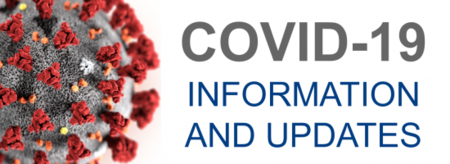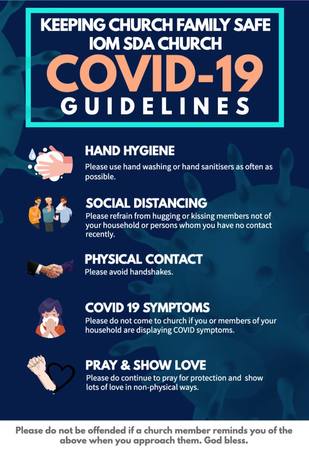
Currently, in the Isle of Man, there are no restrictions in face to face gatherings. Although there are still a significant number of cases in the community, the Isle of Man Government has released a revised version of the Exit Framework, which sets out key indicators for the Island's border, testing and isolation response over the mid term future, based on the UK 14-day notification rate of new COVID-19 cases and deaths, as defined weekly by the ECDC.
UPDATE: November 28, 2021 - By Chief Minister Alfred Cannan
Over the past 72 hours you will have seen and heard a great deal in the news about a variant of the COVID-19 virus that is causing concern. The name of the variant is omicron. It was first detected in South Africa, with news first emerging on Wednesday.
Despite rapid action by governments around the world to prevent the spread of omicron – primarily through travel bans – cases have quickly emerged across the globe, including three cases in the United Kingdom.
As omicron has not yet been detected on the Island, we assess the greatest risk at present to be from those arriving on our shores. Therefore, there are two important policy changes that the Council of Ministers are supporting:
1. All international travellers who are fully vaccinated arriving from outside the Common Travel Area – that is anywhere outside of the UK, Ireland, Jersey and Guernsey – must self-isolate and have a PCR test within 48 hours of arriving in the Isle of Man. They must remain in self isolation until they have received the result back. If they are not fully vaccinated they will still be required to undergo the 7 day isolation period.
All travellers from within the Common Travel Area, regardless of their vaccination status will have to commit to undertaking a Lateral Flow Test within 12 hours of arrival in the Isle of Man. All arrivals from within the Common Travel Area will be required to make a clear statement as to their intent and understanding of this new testing requirement on their landing form and we will develop a facility for them to let us know when they have done so.
These measures will come into force from 4am on Tuesday 30 November.
In other settings, particularly retail premises such as shops and lifestyle settings and in schools, the Government is now expecting everyone to wear a mask. We do not want to make the non-wearing of masks a criminal offence but we will legislate further if we need to. For now we ask everyone to wear them in these indoor public settings. Like the UK we will not be insisting on further measures in hospitality.
And of course Level 2 means we are asking everyone to increase their use of self-tests - especially before attending events or gatherings.Finally, there will be a change in our position around positive PCR test results that are suspected or confirmed as omicron. In these instances the whole household must immediately isolate for ten days.
As a church, we follow the rules of the island, but we also acknowledge the guidance set out by our local conference (NEC) to make sure we keep church family and other church goers safe.
NEC (North England Conference) GUIDELINES
How will church activities be coordinated during the pandemic?
The Pastors of ALL churches have been provided with a Church Continuity Plan, which needs to be completed as a matter of urgency in order to safeguard members, regular visitors and the wider community. Each church will appoint a Responsible Officer and a Church Response Team, chaired by the Responsible Officer and include representation from the pastoral team, church leaders, health professionals, and individuals with experience in areas such as administration, project management, risk assessment and management, counselling etc.
All plans will be sent to NEC on a fortnightly basis or immediately following a significant local development. A NEC appointed Continuity Planning Team will use the information provided to help NEC respond to developments in a co-ordinated and informed manner.
What are Church Response Teams being asked to do?
A Pastor’s job is to shepherd the flock, even if the flock is somewhat scattered for any reason. During the pandemic we are asking local churches to create Church Response Teams comprised of individuals from pastoral team, church leaders, health professionals, and individuals with a range of useful experience in areas such as administration, project management, risk assessment and management etc., will lead and coordinate delivery of practical ways of providing:
- identifying people in need and designating members to check on these people regularly
- providing counselling, encouragement, and pastoral care using phone calls, Skype, Zoom etc.
- addressing people’s fears with the hope of Christ
- using phone calls, texting, and emails to check in with people regularly
- planning for outreach to shut-ins, people with special needs, and the elderly
What should happen if someone becomes ill (or suspects they are ill) from Coronavirus?
To prevent the spread of the virus, individuals should follow the steps below If they are sick with COVID-19 or think they might have it. Following the steps will to help protect other people in your home and community:
- Stay home. People who are mildly ill with COVID-19 are able to recover at home. Do not leave, except to get medical care. Do not visit public areas.
- Seek medical advice if required. First point contact should be 111 via the internet, and by phone only if this is not possible. Be sure to get care if you feel worse or you think it is an emergency.
- Avoid public transportation. Avoid using public transportation, ride-sharing, or taxis.
- Cover. Cover your mouth and nose with a tissue when you cough or sneeze.
- Dispose. Throw used tissues in a lined bin.
- Wash hands. Wash your hands often with soap and water for at least 20 seconds. If soap and water are not available, clean your hands with an alcohol-based hand sanitizer that contains at least 60% alcohol, covering all surfaces of your hands and rubbing them together until they feel dry. This is especially important after blowing your nose, coughing, or sneezing; going to the bathroom; and before eating or preparing food. Soap and water remain the best option, especially if hands are visibly dirty.
- Avoid touching. Avoid touching your eyes, nose, and mouth with unwashed hands.
- Do not share. Do not share dishes, drinking glasses, cups, eating utensils, towels, or bedding with other people in your home.
- Wash thoroughly after use. After using these items, wash them thoroughly with soap and water or put in the dishwasher.
- Clean and disinfect. Routinely clean high-touch surfaces in your “sick room” and bathroom. Let someone else clean and disinfect surfaces in common areas, but not your bedroom and bathroom.
- Stay away from others. As much as possible, you should stay in a specific “sick room” and away from other people in your home. Use a separate bathroom, if available.
- Follow care instructions from your healthcare provider and local health department. Your local health authorities will give instructions on checking your symptoms and reporting information.
